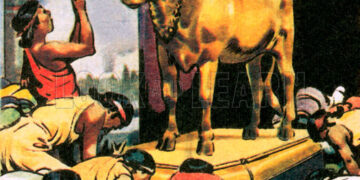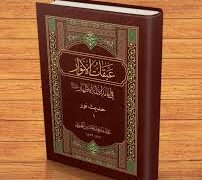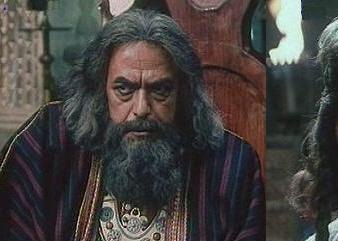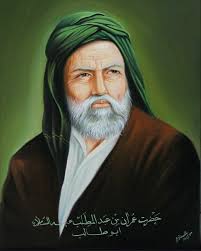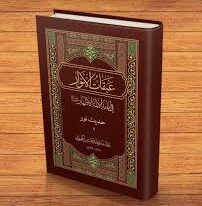There is an authentic narration about Mu’awiya that his supporters were so astonished upon hearing this virtue that they killed the narrator of the hadith. The only…
Religion and Thought Section, “Daneshjoo News Agency” – Hamed Sarem: The religion of Islam is founded on reflection and reasoning, and it is the only faith that invites mankind to think and follow sound intellect. The Holy Quran has repeatedly condemned the lack of reasoning and, quoting the inhabitants of Hell, states that their entry into the Fire was due to their failure to use reason. (1)
However, it must be noted that whenever reasoning is removed from the culture and conduct of Muslims, Islam will not only fail to guide, elevate, and bring happiness, but in such a state, an Islam in which thinking is trampled upon becomes a great danger, leading to misery in this world and wretchedness in the Hereafter.
When Does Nothing Remain of Islam?
In reality, whenever reasoning is abandoned and sound intellect is buried under the rubble of prejudice, wrongful love and hatred, and misguided thinking, nothing remains of Islam. Islam is the religion of rational people, and the ignorant can never attain the honor of embracing Islam. Imam Ja’far al-Sadiq (AS) said: “Whoever possesses intellect has religion, and whoever has religion will enter Paradise.” (2)
The Difference Between True Islam and Umayyad Islam
The duty of Islam without reasoning is to serve the tyrants. It is an Islam devoid of thought that selects its caliphs from the Umayyads, and undoubtedly, an Islam without intellect is none other than Umayyad Islam. An anti-intellectual Islam is one that justifies the heinous actions of Mu’awiya ibn Abi Sufyan, and in this irrational and intellect-rejecting doctrine, merely because Mu’awiya carries the title of a companion of the Prophet, his grave crimes must be concealed.
Reasoning and contemplation are what distinguish humans from animals; therefore, one cannot call a doctrine “Islam” if intellect is suppressed and any form of questioning is prohibited—except to say that this is Umayyad Islam, devoid of any reasoning. Throughout history, Umayyad Islam has always been in service to tyrants, and unfortunately, even today, there are still those who defend Mu’awiya.
If today we introduce Mu’awiya—his thoughts, crimes, and the distortions and innovations he established in religion—to non-Muslim thinkers and present, one by one, his criminal acts, which he persisted in until the end of his life, they will have no choice but to admit that Mu’awiya was one of the greatest criminals in human history. Thus, it is extremely disgraceful that even among Muslims, there are still those who allow themselves to defend Mu’awiya and others like him, or who write books to justify his actions or conceal his crimes.
Mu’awiya: The Son of Four Fathers
Mu’awiya is the son of Hind, and while it is widely believed that his father was Abu Sufyan, researchers from both Shia and Sunni backgrounds hold differing views. They attribute Mu’awiya’s lineage to several individuals, including Musafir ibn Abi ‘Amr, ‘Amarah ibn Walid, Abu Sufyan, and another unknown person.
Hind, the mother of Mu’awiya, was known for bearing certain signs. (3) She had a strong inclination toward engaging in illicit relations with dark-skinned men. Whenever she gave birth to a dark-skinned child as a result of such relations, she would kill the newborn. Sunni scholars have narrated that Musafir ibn ‘Amr was known for his beauty, and Hind fell in love with him and engaged in a relationship with him—an affair that became widely known among the Quraysh.
When Hind was about to give birth, Musafir, fearing Hind’s father, fled from Mecca to Hira. Hind’s father, in return for a great sum of wealth, married her off to Abu Sufyan. Three months after their marriage, Mu’awiya was born. It is also noteworthy that Mu’awiya’s paternal grandmother—the mother of Abu Sufyan—was known to have engaged in similar behavior, and such conduct was common among the Banu Umayya clan. (4)
Illegitimacy: A Source of Pride for the Followers of Banu Umayya
Some readers may find it astonishing how a person with such lineage and family honor could be called a caliph, and how some, who claim to be Muslims, could support him and even profess their love for him. In response, it must be said that this question is valid, and there is no answer for it—except that, in their view, illegitimacy is not considered a disgraceful act or a moral failing, but rather a great source of pride.
It is narrated that someone asked Al-Zuhri: “Is it permissible for an illegitimate person to lead the congregational prayer?” He replied: “Yes, there is no problem with that, as our great leaders were illegitimate.” (5)
The Historians’ Justification for Defending Mu’awiya
After the martyrdom of Amir al-Mu’minin Ali (AS), Mu’awiya managed to seize power and establish the rule of Banu Umayya. Historians tend to defend anyone who becomes a ruler, and thus, merely because Mu’awiya succeeded in taking control, they fabricated an exalted character for him.
They attempted to prove that Mu’awiya had accepted Islam before the conquest of Mecca and, based on this, portrayed him as a scribe of divine revelation. However, their efforts are futile, as Mu’awiya’s status before and after the conquest of Mecca is well known. One of the pieces of evidence that refutes this claim is the admission of historians themselves: the Messenger of God included Mu’awiya among the Mu’allafatu al-Qulub (those whose hearts were to be reconciled) during the Battle of Hunayn and granted him war spoils. If Mu’awiya had been a Muslim before the conquest of Mecca, the Prophet would not have placed him among this group. (6)
Revelations by Mu’awiya’s Own Ally About Him
Ibn Qayyim al-Jawziyya, the prominent student of Ibn Taymiyyah, writes that Mu’awiya accepted Islam in the year of the conquest, after the Battle of Khaybar. (7) Beyond this, the revelations made by Mughirah—one of Mu’awiya’s own political allies and a statesman serving Banu Umayya—have left no credibility or Islamic legitimacy for Mu’awiya. His historical account eliminates any need for debate regarding Mu’awiya’s conversion to Islam.
Mughirah narrates that in a private gathering, Mu’awiya said to him: “By God, as long as I am alive, I will strive to bury and erase the name of Muhammad.” (8) After such a statement, does it even matter whether Mu’awiya accepted Islam in the first year of Hijrah or after the conquest of Mecca? No matter when he supposedly converted, he was a hypocrite whose true intent was to undermine Islam from within.
When Al-Bayhaqi heard some people claim that Mu’awiya lost his faith due to his war against Ali (AS), he responded: “No, that is not the case, because Mu’awiya was never a believer to begin with. He had not entered into faith to have later abandoned it. Rather, during the Prophet’s time, he transitioned from outright disbelief to hypocrisy—meaning he became one of the hypocrites. Then, after the Prophet’s passing, he returned to his original state of disbelief.” (9)
Mu’awiya and the Idol Trade
Abu Wa’il narrates: “I was with Masruq in the region of Silsilah when suddenly, a caravan carrying idols and statues made of copper passed by us. When we inquired about the shipment, we were told that it was an order placed by Mu’awiya from the lands of Sind and India.”
Masruq said: “If I knew that they wouldn’t kill me, I would have drowned all of these caravans. But I fear torture. By God, I do not know what kind of person Mu’awiya is or what category of people he belongs to. Has he lost hope in the Hereafter, so he strives not to lose this world? Or have his evil deeds been made to seem good and appealing to him?” (10)
What Mu’awiya Held in His Hand at the Time of Death
Most astonishing of all is that Mu’awiya held a cross in his hand at the time of his death. If we mix even a little intellect with a small amount of fairness and do not deprive ourselves of these two divine gifts, we can never consider Mu’awiya a Muslim.
Based on all that has been discussed, one must conclude that either Mu’awiya never accepted Islam, or if he did, his Islam was undoubtedly hypocritical. In both cases, the outcome remains the same: Mu’awiya was a disbeliever.
Mu’awiya’s Exemplary Courage in Battles!
Mu’awiya participated in battles that were planned and financed by his father, Abu Sufyan, and displayed great courage. In the Battle of Badr, three of Abu Sufyan’s sons—Hanzala, Amr, and Mu’awiya—were present. One was killed, another was captured, and Mu’awiya fled the battlefield on foot, reaching Mecca in such a state that his feet became swollen and severely inflamed. He required two months of medical treatment. (11)
To enlighten minds, let us compare this scene with another historical account. Although comparing Amir al-Mu’minin (AS) with individuals of no honor and lineage is itself unjust, and truly, to compare the master of courage, honor, light, and guidance with the embodiment of corruption and wickedness is disgraceful, what choice do we have in an era where wickedness is presented as truth, and books are written to prove its legitimacy? This comparison is meant to distinguish light from darkness so that those who reflect may use their reason.
When Imam Ali (AS) completed his mission on the night of the Prophet’s migration (Hijrah), he set off toward Medina, traveling by night and hiding by day. By the time he reached Medina, his feet were bleeding and swollen.
The Prophet (PBUH) said, “Call Ali to me.” They replied, “He is unable to walk.” The Messenger of God personally went to visit him, embraced him, and wept over his wounds. Then, he placed some of his blessed saliva on Ali’s feet, after which Ali (AS) never experienced pain in them again—until the moment of his martyrdom. (12)
Of course, we must not forget Mu’awiya’s bravery in the Battle of Siffin as well, for he demonstrated similar acts of courage there. As he himself admitted:
“I placed my foot in the stirrup and was about to flee on the day of Siffin.” (13)
The Justification of Mu’awiya’s Defenders for Glorifying Him
Interestingly, some of Mu’awiya’s defenders have written the following in an attempt to sanctify and purify his image:
“Mu’awiya did not participate in the battles of Badr, Uhud, Khandaq, and Hudaybiyyah, which were among the most significant battles between Muslims and the disbelievers.”
However, these ignorant defenders have forgotten that if someone failed to participate in battle—especially in the Battle of Uhud—people would send kohl (eyeliner) to them, a symbolic way of calling them a woman and a coward, or they would destroy their house. (14)
In reality, Mu’awiya was one of Islam’s fiercest enemies. He fought against Islam and the noble Prophet (PBUH) as much as he could and strove for Islam’s destruction. After the conquest of Mecca, when Islam’s political and military power had reached its peak, he reluctantly accepted Islam. However, his acceptance was nothing but a tactical move to continue his battle against Islam, rather than sincere submission to God and His Messenger. Yet, many try to erase Mu’awiya’s hostilities toward Islam.
It is as if they have forgotten the intelligence operation of Hudhayfah ibn al-Yaman (under the order of the Prophet PBUH) during one of the nights of the Battle of Khandaq when the Confederates, led by Abu Sufyan, besieged Medina. At that time, the enemy, fearing infiltration by Muslim forces, sat in a circle, holding hands, and asked each other’s names in the darkness of the night.
Hudhayfah, who was trapped among them, narrates:
“With complete skill and intelligence, I asked the person to my left: ‘Who are you?’ He replied: ‘Amr ibn al-As.’ Then I asked the one to my right: ‘Who are you?’ He said: ‘Mu’awiya ibn Abi Sufyan.’ In this way, no one asked me anything, and I managed to escape.” (15)
Hudhayfah’s report clearly indicates that Mu’awiya had reached the trench alongside the Confederates and various tribes, intending to destroy Islam. However, there is no historical account of Mu’awiya ever drawing his sword or displaying courage in any battle for the sake of Islam and the Prophet (PBUH). Either he did not participate in battles at all, or if he did, it was always against Islam.
The Peak of Mu’awiya’s Bravery in the Battle of Siffin
In the Battle of Siffin, every morning, Imam Ali (AS) would come to the battlefield and call Mu’awiya to face him in single combat. He would say, “Why do you send people to their deaths? Come to the battlefield, and let the one who prevails take charge.”
Amr ibn al-As turned to Mu’awiya and said, “This man is speaking to you with fairness.”
However, instead of facing Ali (AS) himself, Mu’awiya forced Amr ibn al-As to fight on his behalf. When Amr entered the battlefield and realized with certainty that Ali’s (AS) sword would send him straight to Hell, he suddenly threw himself off his horse and exposed his private parts. Out of his noble character, Ali (AS) turned his horse away, sparing his life.
One evening, as Mu’awiya and Amr ibn al-As were sitting together at dinner, Mu’awiya looked at Amr and started laughing.
Amr asked, “Why are you laughing?”
Mu’awiya replied, “I am remembering your quick thinking and presence of mind at Siffin when you saved your life from Ali (AS) by exposing yourself!”
Amr responded, “By God, I was on your right when Ali called you to the battlefield. Your eyes crossed from fear, and you revealed something that I am too ashamed to even mention now.” (16)
Mu’awiya’s “great courage” in battle was so overwhelming that, according to Amr, he soiled his clothes—though Amr himself hesitated to say it outright.
The Most Influential Figures in Spreading Fabricated Hadiths
The tradition of Umayyad Islam revolves around fabricating virtues for wicked individuals. The Umayyads were among the greatest distorters of history, altering its course to serve their interests. Without a doubt, the most influential contributors to the widespread fabrication of hadiths were the Umayyads themselves. This betrayal stands as one of the gravest deceptions against the Holy Prophet of Islam.
However, it is a matter of great honor that, thanks to the Infallible Imams (AS), none of the fabricated hadiths promoted by the Umayyads infiltrated Shi’a hadith collections. Without hesitation, one can affirm with certainty that Shi’a hadith books remain pure and untainted by Umayyad fabrications—unlike the collections of the general Muslim populace (Ahl al-Sunnah), where even the most “authentic” books, which claim to be Sahih (sound and reliable), are filled with Umayyad forgeries.
Mu’awiya, the chief architect of spreading falsehoods, invested enormous resources into fabricating hadiths in order to promote Umayyad Islam. However, he was not exempt from the industry of virtue fabrication—a multitude of false virtues were concocted in his favor and widely disseminated among the people. Today, some individuals—who idolize the concept of the absolute righteousness of the Prophet’s companions (Adalat al-Sahabah)—cling to these fabrications.
Nevertheless, the awakened scholars among the Ahl al-Sunnah have warned against the falsehood of these so-called virtues. To keep things brief, we will refrain from listing the fabricated hadiths themselves and instead focus on the testimonies of Sunni scholars acknowledging the falsehood of Mu’awiya’s supposed merits.
There is no authentic hadith in favor of Mu’awiya.
The opinions of Sunni scholars regarding the narrations on the virtues of Mu’awiya should not be forgotten; they explicitly deny the existence of even a single authentic hadith in his favor and state that not a single reliable narration on this subject has reached them.
Ishaq ibn Ibrahim Hanẓali says: “We do not have even one authentic hadith regarding the virtue of Mu’awiya.” (17) Ibn Taymiyya, who is a staunch supporter of the Umayyads and Mu’awiya, states:
“A group of people fabricated virtues for Mu’awiya and narrated hadiths from the Prophet (PBUH) in this regard, all of which are lies.” (18)
Al-‘Ayni, the commentator of Sahih al-Bukhari, says: “There is not a single authentic—meaning well-documented—hadith regarding the virtues of Mu’awiya.” Ishaq ibn Rahwayh, Al-Nasa’i, and others have also explicitly affirmed this. For this reason, Imam Bukhari in his book wrote the chapter “Mention of Mu’awiya” rather than “Virtues and Merits of Mu’awiya.” (19)
Al-Shawkani states: “The scholars of hadith are in unanimous agreement that not a single authentic hadith has been recorded in favor of Mu’awiya.” (20) Ibn Hajar also remarks: “This ignorant and foolish man—meaning Ishaq ibn Muhammad al-Susi—is the one who has reported fabricated and false hadiths, which are so repulsive that the natural disposition abhors them and the ear refuses to listen to them, in praise of Mu’awiya.” (21)
These individuals are among the great scholars of the Sunni tradition, and if their statements regarding hadith cannot be trusted, then the Sunni community cannot rely on anyone else either. However, one question remains: What was the true motivation behind the fabricators who forged hadiths in praise of Mu’awiya?
Can it be said that their only incentive for spreading these falsehoods was the gold coins that Mu’awiya generously distributed, or should we seek a deeper and more significant motive? The reality is that Mu’awiya’s money, dirhams, and dinars were not the sole reason for this phenomenon. There was a more critical underlying cause, which requires an extensive and detailed analysis. However, in response to this question, we will suffice with one narration from Sunni sources.
The Reason Behind Fabricating Virtues for Mu’awiya
Abdullah, the son of Imam Ahmad ibn Hanbal, narrates: “I asked my father about his opinion regarding Ali (A) and Mu’awiya. Ahmad ibn Hanbal paused for a moment and then said, ‘What can I say about these two? Know that Ali had many enemies. They tried hard to find faults in him, but when they could not, they turned to the one who fought against him and fabricated virtues and merits for him, so that they could express their enmity and hostility towards Ali.'” (22)
Ahmad ibn Hanbal, who is known for his strong Sunni leanings, attributes the abundance of false virtues ascribed to Mu’awiya to the intensity of enmity toward Ali (A). However, a crucial question must be asked of Ahmad ibn Hanbal: Did the enemies of Ali (A) fabricate virtues only for Mu’awiya as a means of opposing him, or did they create virtues for anyone who stood against Ali (A)?
If we accept Ahmad ibn Hanbal’s statement on this matter— which, given the overwhelming historical evidence, we have no choice but to accept— should we not also question all the virtues attributed to the opponents of Ali (A)? For instance, should we not critically reassess the reported virtue of Abu Bakr being the companion of the Prophet in the cave, or the virtues attributed to the second and third caliphs, as well as those who were part of the opposition to Ali (A) in the events of Saqifah and the cursed treaty?
Ahmad ibn Hanbal either intentionally refrained or forgot to mention to his son that it was not only Mu’awiya who fought against Ali (A). Aisha, Talha, Zubair, and many others also waged war against him. Perhaps his own bias prevented him from acknowledging that the first battle against Ali (A) took place in Medina, within his own home. The first martyrs from Ali’s (A) sacred household were his wife and six-month-old son, who was tragically killed when the first and second usurpers stormed their house, causing the infant to be crushed behind the door.
Now, considering these points, let us revisit the statement of Ahmad ibn Hanbal. Abdullah, his son, narrates: “I asked my father about Ali (A) and Mu’awiya. My father remained silent for a moment and then said, ‘My son, what can I say about these two? Know that Ali (A) had many enemies. They tried to find flaws in him, but when they could not, they exalted the one who fought against him and fabricated virtues for him, all in an attempt to show their enmity towards Ali (A).’”
This statement should be revised as follows:
“One of the greatest betrayals committed by the enemies of Ali (A) was fabricating virtues for all those who fought against him—from Abu Bakr and Umar to Aisha and Mu’awiya.”
Although this statement from Ahmad ibn Hanbal’s son leads to further significant conclusions, we will limit our discussion to this single question for now.
However, in the interest of fairness, among all the fabricated hadiths regarding Mu’awiya’s virtues, there exists one authentic and credible narration. It would be unjust not to mention this single, verified virtue that has been transmitted to us with an authentic chain of narration.
The Only Authentic Narration About Mu’awiya
In reality, there is only one authentic narration about Mu’awiya that has been recorded in the hadith collections. The supporters of Mu’awiya were so elated upon hearing this narration that they went as far as to kill the narrator of this hadith. The only authentic narration regarding Mu’awiya is that the Prophet (PBUH) said: “May Allah never satisfy the stomach of Mu’awiya.”
Imam al-Nasa’i, while in the mosque in Damascus, was asked by Mu’awiya’s supporters to narrate a hadith about Mu’awiya’s virtues. He replied: “I do not know of any virtue for him except this: ‘May Allah never satisfy your stomach.'” After hearing this, Mu’awiya’s supporters tortured Imam al-Nasa’i, beat him, and expelled him from the mosque. Due to this torture, Imam al-Nasa’i passed away. (23)
According to al-Dhahabi, Mu’awiya was never full and was considered one of the gluttons of the world. (24) Ibn Kathir reports that Mu’awiya would eat seven meals a day, and large dishes filled with food and meat were brought to him at every meal. He would eat them and say, “I am tired, but I am not full.” (25)
When Mu’awiya Becomes a Proverb
For this reason, the so-called great virtue of Mu’awiya, which an ordinary person cannot attain, has become a proverb used for someone who eats excessively and never gets full. Some have said:
“و صاحب لی بطنه کالهاویه کان فی امعائه معاویه؛”
It is as if in the stomach of the one who is always hungry, there is a Hell, and surely Mu’awiya resides in his intestines because he can never become full.
The Companion of the Prophet Who Killed the Youths of Paradise!
What has been presented so far offers an outline of Mu’awiya’s character and sheds light on who his supporters are and how deeply misguided his followers might be. From this brief discussion, it becomes clear that supporting Mu’awiya is impossible unless one shuts down their reasoning and replaces intellect with blind partisanship.
Next, we will discuss his betrayals against Islam during the time when he ostensibly embraced Islam, during his rule as the governor of Syria under ‘Umar and ‘Uthman, and after ‘Uthman’s assassination. We will also look at his role in instigating the battles of Jamal and Siffin, and later, his rise to power, which enabled him to sideline his opponents through cunning, deceit, and manipulation.
Mu’awiya’s innovations and attempts to sow discord are among the greatest calamities in the history of Islam. Many of Islam’s greatest figures, the chosen ones of Allah, were martyred at his hands. He was the one who masterminded the assassination plot against Imam Hasan al-Mujtaba (A), which was carried out by his agents in Medina.
It may be a bitter truth that, unexpectedly, Mu’awiya orchestrated the tragic event of Ashura in Iraq and laid the groundwork for it during his lifetime, culminating in the martyrdom of Imam Husayn (A), carried out by his even more wicked son, Yazid. In fact, Yazid the accursed was the executor of a vile conspiracy that had been designed by Mu’awiya, and this matter must be thoroughly examined.
In one sentence, Mu’awiya is the killer of two grandsons of the Prophet, two grandsons about whom the Prophet said: “Al-Hasan and Al-Husayn are the leaders of the youth of Paradise.” What sound mind can accept that the killer of the masters of Paradise, simply because he is a companion of the Prophet, would enter Paradise, except for a mind that has been distorted by the propaganda of the Umayyads?
Footnotes:
- Surah Al-Mulk, Verse 10.
- Usul al-Kafi, Vol. 1, p. 11.
- He would put up a flag at his door inviting to adultery by descent.
- Sharh Nahj al-Balagha al-Khui, Vol. 3, p. 350; Sharh Nahj al-Balagha Ibn Abi al-Hadid, Vol. 2, p. 102; Matalib al-Arab, p. 72; Rabi’ al-Abrar, Vol. 3, pp. 549–551; Al-Aghani, Vol. 9, p. 49; Al-Aqd al-Farid, Vol. 6, p. 86.
- Al-Muhalla, Vol. 4, p. 213, Dar al-Afaq al-Jadida, Beirut.
- Sharh Nahj al-Balagha Ibn Abi al-Hadid, Vol. 1, p. 490.
- Ahkam Ahl al-Dhimma, Ibn Qayyim al-Jawziyya, Vol. 1, p. 91.
- Sharh Ibn Abi al-Hadid, Vol. 5, p. 129, quoted from Al-Mawafiqat Zubayr ibn Bakr.
- Al-Kamil li al-Tabari, Vol. 2, p. 204, Chapter 27, Section 2; Al-Kuna wa al-Alqab, Vol. 2, p. 114. “Indeed, Mu’awiya left faith when he fought against Ali (a.s.)… He said: Mu’awiya did not enter into faith until he left it, rather he exited from disbelief into hypocrisy during the time of the Messenger (s.a.w.) and then returned to his original disbelief after him.”
- Ansab al-Ashraf, Vol. 5, p. 137.
- Sharh Nahj al-Balagha, Ibn Abi al-Hadid, Vol. 15, p. 85.
- Al-Kamil, Ibn al-Athir, Vol. 1, p. 519; Ihyā’ al-Turāth al-‘Arabī.
- Tarikh Dimashq, Vol. 59, p. 138; Siyar A’lam al-Nubala, Vol. 3, p. 156; Al-Aqd al-Farid, Vol. 4, p. 340; Sharh Nahj al-Balagha, Ibn Abi al-Hadid, Vol. 8, p. 59; Wafayat al-A’yan, Vol. 5, p. 241.
- Al-Imta’a, p. 66; Bihar al-Anwar, Vol. 19, p. 2.
- Al-Maghazi, Vol. 2, p. 488; Sīrah Ibn Hishām, Vol. 3, p. 242.
- Al-Aqd al-Farid, Ibn Abd Rabbih, Vol. 3, p. 110.
- Al-La’ali al-Masnu’a, Vol. 1, p. 388; Al-Mawdu’at, Vol. 2, p. 24; Al-Fawa’id al-Majmū’a, p. 407; Al-Bidaya wa al-Nihaya, Vol. 8, p. 123.
- Minhaj al-Sunnah, Vol. 2, p. 207.
- Umdat al-Qari, Vol. 16, p. 249; Fath al-Bari, Vol. 7, p. 83; Irshad al-Sari, Vol. 6, p. 141; Wafayat al-A’yan, Vol. 1, p. 77.
- Al-Fawa’id al-Majmū’a, p. 407.
- Lisan al-Mizan, Vol. 1, p. 374.
- Al-Muntazim, Vol. 3, p. 372.
- Siyar A’lam al-Nubala, Vol. 14, pp. 132–129; Wafayat al-A’yan, Vol. 1, p. 77.
- Siyar A’lam al-Nubala, Vol. 3, p. 123.
- Al-Bidaya wa al-Nihaya, Vol. 8, p. 123


